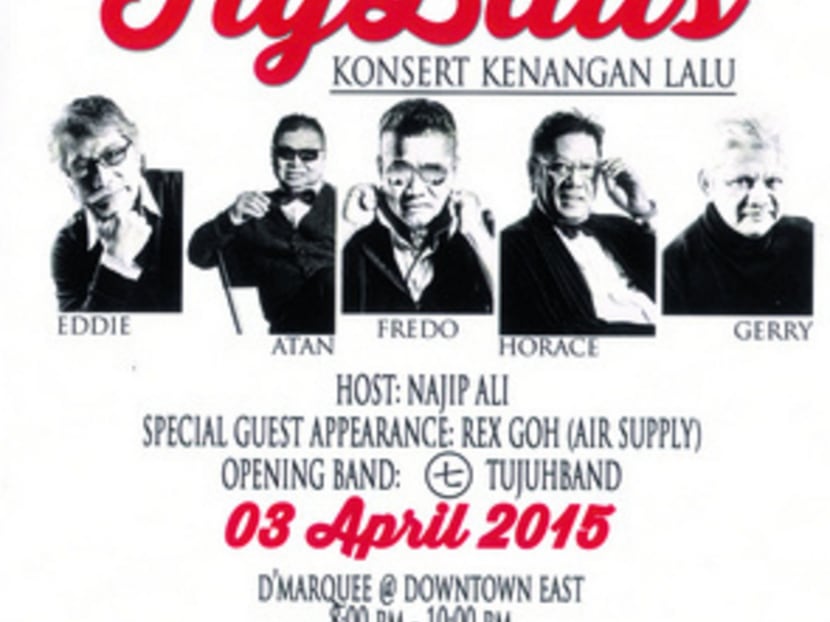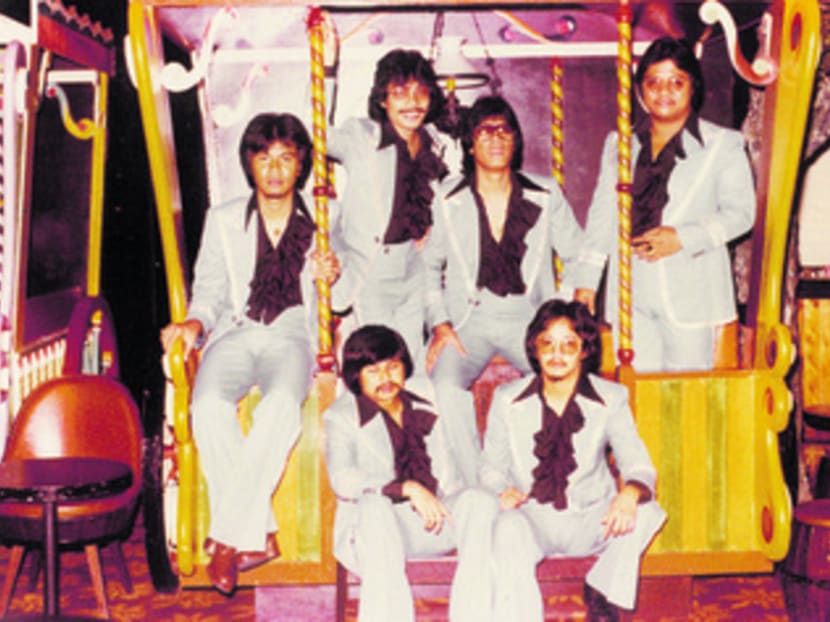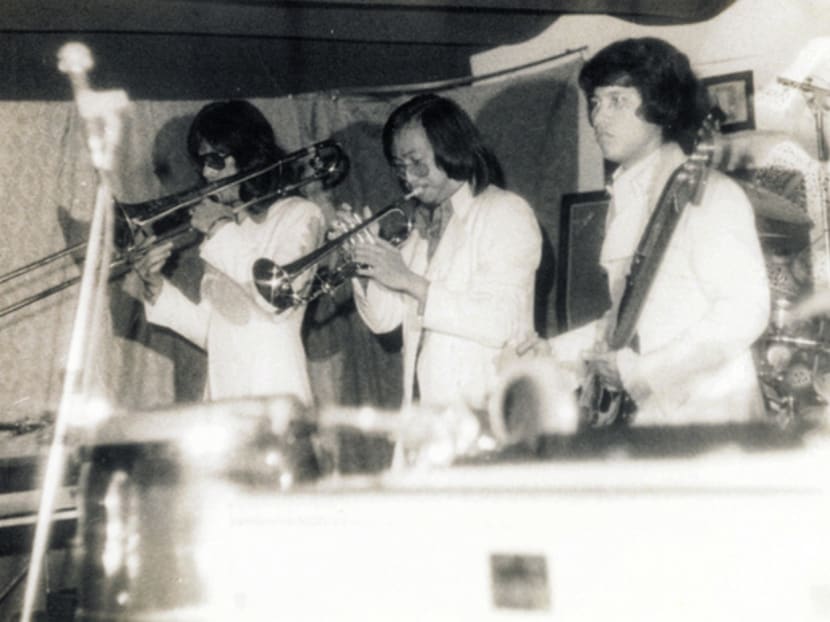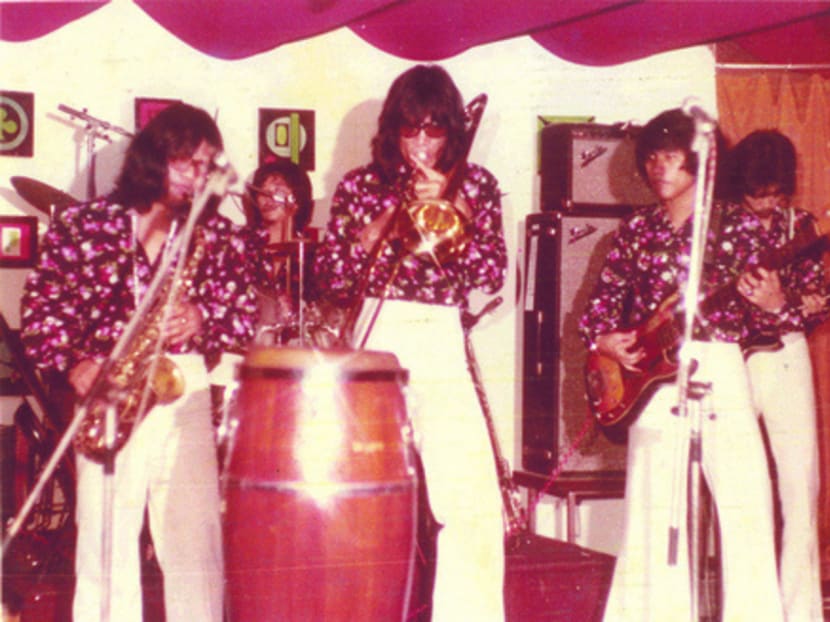Legendary S’pore band The Flybaits reunite for one more hurrah
SINGAPORE — Atan Ahamad bin Osman and Horace Hutapea have been going from place to place, seeking permission from restaurants and shop owners to distribute flyers for their upcoming concert.




SINGAPORE — Atan Ahamad bin Osman and Horace Hutapea have been going from place to place, seeking permission from restaurants and shop owners to distribute flyers for their upcoming concert.
But just to be perfectly clear, they aren’t from some young up-and-coming band but from one of Singapore’s legendary groups — The Flybaits.
On April 3, five of the “core members” of the final incarnation of sextet — Hutapea, Atan, Villenguez Alfredo Valentino aka Fredo, Gerry Lachica and Eddie-Mohamed Ismail Mazuki — are reuniting for a concert at D’Marquee in Downtown East
Hosted by Najip Ali, the show will feature another legend, Rahimah Rahim, who used to perform with the band. Guitarist Rex Goh, a former member who would later join Air Supply in the late ’70s/early ’80s, will be making a special appearance while Malay pop band Tujuhband will open the show.
“Jeff (Tan, the drummer) will not be able to make it because he’s not feeling too good these days,” said Fredo. “We are looking forward to the concert although we haven’t performed together for more than 30 years but I think that we can do this.”
This is not the first time certain members of the band have come together for a show — some of them reunited for the Singapore Heritage Festival concert a few years ago — but this is the first full-length concert featuring almost all of the core members since the early ’80s. And it’s for a good cause: They’re hoping proceeds will help offset the costs of an ailing Lachica’s medical treatments.
“Gerry initially said, don’t mention me, because he didn’t want people to come to the show out of sympathy,” said Atan. “He wants them to come to the show for the music.”
“But without him, the band would not come together ... because of our differences in age, character, style,” added Fredo. “We don’t always see eye-to-eye but because of him, we have.”
The band had tried to reunite on several previous occasions without success. “We had this idea in 2002, when a record company wanted to do a 12-hour show with The Flybaits as the highlight of the show,” said Atan. “But then there was SARS, so that show was cancelled. A few years later, other people approached us, but it never materialised.”
Logistics was a hindrance. “They called me three times to come back,” said Fredo, who, like Eddie, now lives in Malaysia. “And three times they failed.”
Atan added: “After more than 30 years, it’s not easy to get people back together. Everybody has their own lives, their own commitments. The fact that we have managed to get back together and put aside our differences ... okay, we may still have some nitty gritty problems but it’s manageable! We have decided to come together and remove all those differences ...”
Because the band is doing everything themselves — no promoters or agents, just assistance from family and friends — the going has been “a little tough”, said Hutapea. But this reunion concert has sparked interest among fans online and if their enthusiasm is similar to that of television actor Suhaimi Yusof (of The Noose), then Hutapea might ease his mind a little.
“When I was a radio DJ with Warna, I used to play all their songs,” Suhaimi said. “Those guys sang from the heart and that’s the reason why (their popularity) has lasted for so long.”
THE GOOD OL’ DAYS
The Flybaits technically came into being only after they were contracted to play at The Kelong, a restaurant and club located at the Cathay Building. Prior to that, they were called The Asians. Why the name change? “It was because of ‘rice bowl issues’,” said Fredo. “The owner of the club changed our name because the place was called Kelong. Same thing with other group, The Fishermen, who played there.”
“I think that was one of two times when we ‘sold out’,” added Hutapea. “The other time was when we were called The Navigators because the place we played at was the Neptune theatre restaurant. So for two years we were The Navigators. All our Flybaits fans didn’t know where we were!”
Right from the get-go, the band didn’t want to be your typical guitar-bass-drums outfit. “There was a band called Renaissance and they were only a five-piece band but they sounded like a hundred-piece,” said Fredo. “They were multi-instrumentalists. That’s why we started doing that, too.”
Hutapea, for example, not only plays the trombone, but the keyboards, while Atan plays trumpet, French horn and flute. They built a reputation for emulating the big funky sounds that were popular at the time, a la Earth, Wind & Fire, Blood, Sweat & Tears, Chicago and Tower Of Power. They played at key venues such as The National Theatre and were kings of the nightlife scene, playing in hotels and clubs, including the Kasbah, Barbarella, Bill Bailey’s Lounge, Merlin Hotel and Apollo Hotel.
“We always had a contract and we always had work,” said Lachica in an interview back in 1984.
“Most of the bands then had a lot of respect for The Flybaits, I think,” said Fredo. “We were the benchmark at the time. Even the Filipino bands ... I remember one Filipino musician came up to me and said, like in a cowboy movie: ‘I heard you were in The Flybaits and you’re the best bass player in the region’. Like he was challenging me. So he showed me his bass moves and I showed him mine ... and then he became my student.”
“I remember we were playing at Barbarella in Ming Court,” said Atan. “It was really swinging. People were waiting outside to get in to see us, even though we were sharing the stage with this band from Jamaica.”
Fredo added: “One time, the American Navy guys came in and they said, ‘That band is crap, but your band, you guys are bad’. And I said: ‘Sorry, we didn’t have enough practice this week.’ And they corrected me: ‘No, ‘bad’ means good!’”
The Flybaits had an evolving line-up through the years, including guitarist Rex Goh, who left in the early ’70s. In the late ’80s, with only Lachica being the sole original member, The Flybaits’ roster included popular musicians Bani Farouk and Kuo Po. They also backed up singer Rahimah Rahim.
Of course, like all the bands in the ’70s, The Flybaits were affected when the government started to clamp down on nightclubs. The solution? They resorted to paying in restaurants and hotels.
“During that period, we were playing at the Neptune and every night, there were ministers having dinner there,” said Hutapea. “We couldn’t show we had long hair, so we had to pin back our hair. What could we do? We had to cari makan (find food). And our music couldn’t be loud so we had to play very softly. Sometimes, there’d only be one couple at the place and the technicians would say things like, ‘Aiyah, only one couple, let’s drive them out’, so while we were playing, halfway through, the curtains would come down and that would be the end of the show.”
MALAY POP POWERHOUSE
The band also made appearances around the region, such as in Taiwan, Thailand and Hong Kong. “That was difficult because we missed our families,” said Atan. “I remember I was crying when I talked to my wife over the phone (when we were overseas) and at first I was a bit embarrassed ... then I found out everybody did, too.”
After their stint in Taiwan, the band’s popularity surged again when they were asked to record an album for the Malay market. “This was in 1979. We were a covers band so when we did mostly English songs. But I guess we weren’t so much appreciated that way,” said Hutapea. “So we agreed to do the album and wrote some Malay songs.”
Recorded in Lion Studios, the album, Mempersembahkan, sold 25,000 copies in Singapore and Malaysia. “The pirate copies sold about 100,000!” quipped Atan. “But in a way, it was good, because that meant more people got to hear our music.”
Prominent Malay pop songwriter M Nasir helped out on several songs and wrote their big hit, Kenangan Lalu, which was translated into several languages, including Tagalog, Cantonese and Mandarin (the latter two were done by Taiwanese songbird Teresa Teng). “I was so surprised,” said Hutapea. “They did it really nicely — better than our version.”
The album also featured what was arguably the first Malay rap song, Bergurau Senda. “I wrote the lyrics,” said Atan. “We were recording our album when Rapper’s Delight, which was the first rap song, came out. So I thought why not incorporate that idea, just the musical phrase? I combined it with traditional Kelantan music, dikir barat. I took the style of writing from that.”
The song poked fun at the members of the band with each of them getting a rap part. “I thought it would be better to write about us, in a funny way, so that people can laugh with us,” said Atan.
Following that album’s success, The Flybaits released three more and had more than 20 hits in total, but the band never stopped honing their craft, picking up tips from the other bands on the circuit.
“In those days, we didn’t have the technology but we still could create all these sounds,” said Atan.
“It’s all hard work,” said Fredo. “We practised very hard. For example, our drummer used to play rumba only, but when he joined the band, he learnt to play every style. We believed that self-progression was important. The group can’t progress if the members themselves aren’t progressing; and the members’ progression was driven by passion.”
THE BREAK-UP
In the end, passion wasn’t enough to keep the band together. By the time The Flybaits called it a day, only Lachica was left from the original group. “Why did we split up? Let’s put it this way: Husbands and wives will quarrel, right? What more with six people on the same stage who have been together for many years?” said Atan.
Said Hutapea: “The pressure really came when we were playing at The Kasbah in the Mandarin — seven nights a week for seven years. No day off.”
“They gave us one month’s leave but without pay. How to survive?” added Fredo.
The Flybaits’ didn’t just have to play at the club, they had day jobs, too. Fredo was teaching music, Jeff the drummer had a tailoring business, and Hutapea was in insurance. The stress became almost intolerable when they were recording their albums. “We’d finish at 2am or 3am, have supper for a while, then rush to the studio to record, where we’d record until 9am or 10am, then go home and sleep a bit before heading to the club to rehearse.”
“One time, Horace awoke and looked at his watch — it said nine o’clock and he thought he was late for the show,” Fredo recalled. “He rushed to the club before he realised it was 9am and not 9pm.”
“I saw a cleaner sweeping the floor and it didn’t even occur to me that they did that only in the morning,” said Hutapea.
The stress took a toll on the band members and tempers started flaring — even while onstage.
“We had a bad night once, playing badly, singing the wrong words,” said Atan. “Horace accidentally knocked over a microphone and Gerry, being the witty person he is, quickly said: ‘That was about the best thing you did tonight.’ Horace was quite angry and I had to tell him, ‘Horace, people are watching’.”
Combined with getting crummy management deals and growing egos within the band, “everyone was trying to get away from music — life wasn’t very nice”, said Atan.
Hutapea agreed: “Music wasn’t a passion any more — it was a burden. We hated it. I was the first to leave. I actually gave notice, but their wives called my wife asking me not to go — because of sentimental reasons and all that — so I stayed until they found somebody to replace me.”
“All the great bands, like The Beatles, in the end they still split up, right?” said Fredo.
WITH A LITTLE HELP FROM THEIR FRIENDS
Now, The Flybaits are entering the final furlong for their April concert and things aren’t looking as bright as Hutapea would like it to be. “I have been worried about ticket sales,” he admitted. “I have been told that people usually buy tickets only at the last minute, but I used to work in sales and in that line, you don’t do anything if the numbers aren’t there. Still, we’re doing what we can because we want to make this happen.”
There was a bright spark, however. Earlier this year, Fredo asked them to go to Malaysia to promote the concert there. They were buoyed by the treatment they received.
Atan said: “Fredo used to say, ‘You don’t know how big The Flybaits are in Malaysia’ but I thought he was exaggerating. I’d always thought that there was prejudice against Singapore bands who go to Malaysia, but ... they really proved me wrong. The Singapore media doesn’t give us any time of day but in Malaysia, we’re like big stars.”
Added Fredo: “Like Aaron Aziz! I told them so but they all keep thinking I just like to talk big.”
“Not to insult him or anything, but he can be quite boastful, lah,” quipped Hutapea. “However, when we went there, I realised we were wrong. The Malaysian media sees the history and legacy of The Flybaits. They recognise us for what we are.”
Many music enthusiasts may talk about the DIY music culture of the ’90s but it probably doesn’t get much more DIY than what The Flybaits are doing. “We’ve had to do everything ourselves,” said Atan. “Horace and I went all over Singapore — to cafes and food stalls — to distribute the posters.”
However, fortune favours the brave and The Flybaits have seen friends and family volunteering their help. Through contacts, they met people who offered their services for free. Even Najip Ali, Rahimah Rahim and Rex Goh aren’t asking a cent for their appearances. Incidentally, Rahimah was included thanks to a chance meeting: The band had to record a commercial for radio and they bumped into her at the recording studio,
“She said, Why didn’t you ask me to be in the show?” said Hutapea. “So we asked and she said yes. So now she’s in the show.”
The band also managed to get the venue without having to put a downpayment. “We were shocked. (The venue manager) basically said, ‘I give you the place and everything and you just get your act together’. That’s how much trust he had in us,” said Fredo. “I think he has put his head on the chopping board for us because I don’t think many people would do this. Singapore, these days, everything is about business. Like the Cantonese say, moh chin, moh gong yeh (no money, no talk).”
All this recent activity has sparked off talk of future projects, but right now, Hutapea said they’re staying focused on the objective of the concert. “We’re not thinking of renumeration right now; as long as we can pay the musicians, pay the costs and all that ... if we break even, we’ll be happy and we can use what we earn to help Gerry.”
And they guarantee that fans will have a good time. “We’re not just about the music, we want to put up a good show. Our comedy, music, dance steps, vocal harmonies — it’s like Metro, you have everything,” joked Atan.
Fredo quipped: “Buy our ticket. We’ll show you what The Flybaits can do.”
The Flybaits perform on April 3, 8pm, at D’Marquee in Downtown East. Tickets from Ticketbooth, Muzika Records or AXS machines. Email theflybaits [at] gmail.com for bulk purchases.










